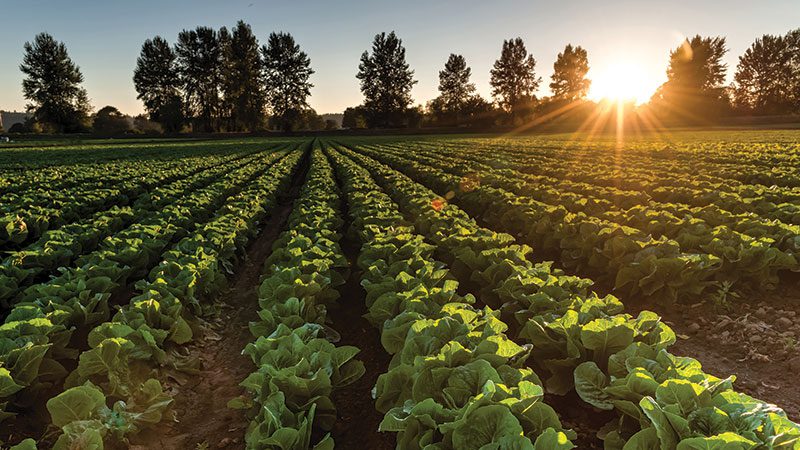Organic is in Trouble – Here’s How You Can Help

Drastic cuts in federal funding have put the U.S. Department of Agriculture’s National Organic Program (NOP) at risk, according to a leading advocacy group. The National Organic Coalition (NOC) is urging people who care about a government-backed organic standard to speak out, saying that the future of organic farming is on the line.
PCC is a longstanding member of NOC, and PCC members were integral in establishing certified organic standards first for Washington state and then for the nation.
“PCC Community Markets is a proud member of the National Organic Coalition, reflecting our long history of leadership in advocating for strong organic policies both in Washington State and at the national level,” said Mike Wenrick, PCC’s Director of Purpose.
“We encourage members of the PCC community to stay informed by joining NOC’s email list and advocating in support of NOC’s work to safeguard organic standards.”
What’s at risk in organics
The dramatic changes began in December, when Congress passed a last-minute spending package and Farm Bill extension to avert a federal shutdown. This spending package did not include funding for what are commonly called “orphaned organic programs,” meaning they do not have a permanent funding source.
They include:
- The Organic Certification Cost Share Program (OCCSP), which helps organic farms and businesses offset certification costs. NOC said in a press release that “without it, certification costs will increase significantly in 2025 and may force some farms to abandon certification altogether.”
- The Organic Data Initiative (ODI), which NOC says is critical for collecting and analyzing data to support organic agriculture.
- The Organic Certification Trade and Tracking Program (OCTT), providing the technology infrastructure needed to enforce organic regulations and prevent fraud.
“Members of Congress need to hear that this is a problem, because farms who certify as organic are going to see a huge increase in their costs in 2025 to get certified,” said Abby Youngblood, executive director of NOC, in an interview. If not restored, she said the cuts will also put the integrity of organic products at risk.
“I think there’s bipartisan agreement that we don’t want U.S. farmers to be undercut by product coming in that are not actually organic…” Youngblood said. “Consumers don’t want product that is passing itself off as organic.”
After some high-profile cases involving both domestic and imported products, tighter regulations passed in 2023 were aimed at strengthening protections against organic fraud.
“We’ve made huge progress on that issue, and the National Organic Program at USDA is doing a much better job, but Congress just took away the money they need for their trade and tracking system, like the database they’re using to make sure the imported products that come in have authentic documentation, and have that full traceability back to the farm where they came from,” Youngblood said.
Separately, abrupt disruptions in federal funding in January and February — many now embroiled in court challenges — threaten organic farming.
“Actions by the Administration to freeze federal grants and loans, including programs that fund organic research and organic transition support, threaten farmers’ livelihoods and the organizations who support them,” according to a NOC statement.
Staff cuts or funding cuts at the NOP means weaker enforcement of organic standards, the statement said, while efforts to overturn regulations protecting organic farmers would make it harder for small farmers to compete and undo “years of work to create a fair marketplace and strong standards.”
Defunding programs aimed at equity goes against a central value for the organic community, according to NOC, and means nonprofit food and farming organizations are losing critical staff and programs.
Why Washington state matters in organics
Washington state is a leader in organic agriculture, with the Washington Organic Foods Products Act enacted in 1985 (more history is online here.) Washington is currently a top organic producer, with $1.1 billion in annual sales from nearly 1,300 certified organic farms.
PCC and its members have been involved since the earliest days, arguing that it’s important to have clear standards for what “organic” means and a government-backed system to uphold those standards and prevent people from labeling food as organic if it violates those rules.
Its efforts over the years include:
- PCC was instrumental in starting both the organic egg and organic milk markets in the Puget Sound region.
- PCC staff helped build organic standards in Washington state and fought for stringent federal standards.
- In 1997, PCC members sent more than 30,000 comments to the USDA on the proposed federal regulations, representing a full 10% of all comments received nationwide.
- Goldie Caughlan, PCC’s longtime nutrition education manager, served on the National Organic Standards Board, the federal organics advisory board, from 2001 to 2006.
- PCC was a founding organizer of the state Coalition for Organic and Regenerative Agriculture (CORA), established in 2022.
Washington representatives are also in key positions to protect organic farming.
Senator Patty Murray (D-WA) serves on the Senate Appropriations Committee. Congressman Dan Newhouse (R-WA) is a key voice in agriculture policy.
“They have the power to protect organic farming—but they need to know this issue matters to you,” the release said.
How You Can Help
Your voice is powerful. Here’s what you can do today:
- Sign up for NOC urgent updates: Stay informed about policy threats to organic agriculture. Subscribe here.
- Tell Congress to fund organic programs: Ask lawmakers to fund the National Organic Program and organic farmers. Sen. Murray’s office numbers are online here; written messages can be sent through this form. For those in Rep. Newhouse’s district in Central Washington, his contact information is online here.
